- Home
- Alison McGhee
All Rivers Flow to the Sea
All Rivers Flow to the Sea Read online
Here is the school bus. Here is the school bus door, chuffing open with its familiar wheeze. Here are the school bus steps. Put your right foot on the bottom one. Haul your left leg up to the next. Here is mean Katie the bus driver, scowling out the big bus window. Here is your backpack, heavy and hurting your shoulders. Where is your sister Ivy who should be behind you, shoving at you to hurry up? Ivy is not here. You and your sister had an accident. Now you are on the bus. Walk down the aisle. There’s an empty seat. Sit down. Now everyone is on the bus. Now Katie shuts the door and shoves the big black gear stick.
Your first day back is over. The bell that is not a bell has blared, and the school day is over.
Jimmy Wilson is next to you on the old green vinyl seat. Jimmy Wilson, who has been silently in love with you since kindergarten. The bus jolts and bumps and groans and grinds its way around the curves of the Sterns Gorge. You are back on the bus.
Your sister Ivy and you had an accident.
The world should have stopped, but it didn’t.
One month has passed since that day of the accident, the accident that you and your sister were in. One month has passed since that day at the end of March when time plucked you up and set you down again, here in this new place. In that month, Katie the bus driver stopped wearing her Dairylea windbreaker and Jimmy Wilson stopped wearing the fur hat that his uncle brought back from Russia. No more winter boots. No more mittens and scarves. Brown grass is now green. Every class has marched on: Goodbye, Romeo and Juliet; hello, Hamlet. Goodbye, World War II; hello, Korea. Goodbye, rudiments of string theory, and hello, chaos complexity.
Your sister Ivy and you had an accident. The world should have stopped, but it didn’t. The world kept on going.
How can the world just keep on going? An earthquake in India kills a thousand people, and the world keeps on going. A famine in China kills a million people, and the world keeps on going. The twin towers of the World Trade Center buckle and fall, and the world, the world keeps on going.
You get up in the morning. You go to the bathroom. You make toast and butter it and eat it. You make coffee and go to the bottom of the stairs and call up to your mother. “Coffee’s ready!” Your neighbor William T. Jones drives by in his pickup and waves. You wave back. The phone rings and you pick it up. You watch yourself doing all these things. You feel as if you are set apart from yourself. Sometimes you think of yourself as you, not I.
Inside, your heart can barely contain itself from the weight of its aching.
Jimmy Wilson, next to you, isn’t looking at you. Jimmy Wilson, next to me, isn’t looking at me. It’s me, Jimmy, me. Rose. Rose-you’ve-known-all-your-life Rose. Warren Graves isn’t looking at me either. Katie didn’t look at me when I got on. No one’s looking at me. I’m invisible. Hello, I’m Rose Latham. I’m Rose, hello. Can no one talk to Rose anymore? How can you just keep on like this? I want to scream. How can you keep living your stupid, stupid lives, when everything is changed?
Ivy and I had an accident. It was dusk in the Adirondacks that night.
Ivy’s sleeping now. I sat by her bed for the past month, waiting for her to wake up. I refused to miss the moment when she woke up.
“I’m not leaving her side,” I said to the doctor and the nurse and my mother and William T. “Imagine if she woke up and I wasn’t here.”
Who else would be there? Not our mother. Our mother works at the Utica Club Brewery all day, and then she drives home, north into the foothills, and spends the evening keeping her fingers busy. So I waited. Waited. Waited.
But she slept. Ivy slept, and slept, and slept. She’s still sleeping. And they started chipping away at me. You can’t stay here forever, can you, Rose? You need to get back to your routine, don’t you? Back to Sterns High, where all your friends are surely missing you, and where you surely must have a ton of work to catch up on. You come down every day after school if you want, they said, but there’s nothing to be gained at this point by having you sit by Ivy’s bed. The best thing you can do for your sister is to get back to your routine.
How do they know what’s best for Ivy?
Jimmy’s half-turned around in the seat, talking to Warren. Topic of conversation? The geodesic dome on top of Star Hill. Jimmy sent my mother and me a card after the accident.
“I’m telling you, the CIA owns it,” Warren says.
“You’ve been saying that for as long as I can remember,” Jimmy says. “Time to change that channel.”
“Mark my words.”
Jimmy shakes his head. “It’s a former commune. It’s a holdover from the sixties. Organic vegetables, et cetera.”
“So they would have you think,” Warren says. “So they would have the unsuspecting masses think. You’re playing right into their hands, Wilson.”
How many times in my life have I listened to Warren Graves and Jimmy Wilson talk about the geodesic dome? People like Warren, who believe in conspiracies, are smug. They know better than everyone else. They have access to secret information denied the rest of the world. They are devotees of complexity.
“Chaos complexity,” Mr. Carmichael said this morning in science.
He stood at the chalkboard nodding slowly, the way he always does when introducing a new concept. That had not changed in a month either.
“A butterfly flaps its wings in the Amazon rain forest and generates enough wind to create a typhoon in Japan,” he said. He was still nodding slowly. “The tiniest of movements on one side of the world sparks something unexpected on the other side. Something unforeseen. Something with consequences undreamt of.”
What about a movement that isn’t tiny? What about a medium movement, a movement like a blue truck sliding into the car that Ivy and I were driving? What about that action, that consequence?
Ivy and I had an accident. It was dusk in the Adirondacks that night, and we were coming around a curve.
Jimmy’s still half-turned around. Warren’s still pontificating about the CIA and the geodesic dome. I want to scream.
“What am I, a moron?” Jimmy says.
“If the shoe fits,” Warren says.
Back and forth they go, the way they always go. Shut up, Warren. Shut up, Jimmy. Don’t they know that everything has changed now? How can they still care about their stupid geodesic dome?
My sister has been without me the entire day. What if today was the day she opened her eyes? What if today was the day she defied the odds, defied the young doctor with the curly brown hair, and opened her eyes the way she did that one time when they said it was just a reflex, and looked around, and I wasn’t there? My stomach hurts. I spread my fingers out on my lap. Long and slender. Piano-playing fingers, if we had a piano, which we don’t. If my fingers were webbed, I would be a strong swimmer, one of the strongest around. I would be a duck. Duck-girl. Rose the Duck-girl. Rosie the ducky girl, three bucks a peep.
I put my hand on Jimmy Wilson’s thigh.
Jimmy’s head comes half swiveling back toward me, then he catches himself. He sits still. His entire body is alert. Air before a summer storm, green and electric. I sense it through my fingers, through my palm, which rests on his thigh.
“Hey,” Warren says. “Wilson! I’m talking to you! Are you having a seizure? Do I need to put a pencil between your teeth?”
He waves his hand in front of Jimmy’s face. “Hellooooo?”
I stroke Jimmy’s thigh.
“Wilson!”
“I’m here,” Jimmy says.
Beneath my jacket, and behind my backpack, my fingers keep on stroking. This is different. This is something that’s changed. I stare out the bus window. Jimmy’s house appears.
“See ya,” Warren said. “Wouldn’t want to be ya.”
/>
And Jimmy’s gone.
And I’m still sitting on the bus with my arms clasped around my knees, self folded on self: muscle and bone and blood, contained. I am still water. I am water that wants to be a river but is a lake. I am water trapped inside the cage of my body. I am water that wants out. Let me out. Release me.
Ivy and I had an accident. It was dusk in the Adirondacks, and we were coming around a curve. And that was my moment, my moment when time tilted, plucked me up, and set me down again in this unimagined place.
And sometimes every minute is another effort not to scream. Not to scream, and scream, and scream.
My sister knew when I felt this way. My sister knew I hated noise, loud noise, noise that assaulted my ears. She knew I hated the bell at school, that blast of sound that rips through the corridors and halls. Why’s it called a bell? Bells ring. Bells chime. Bells are everything that this sound is not.
“What is it with you, Rose?” Ivy said once last year. “You’re not some fragile flower.”
We were outside, me covering my ears with my hands and cowering: fighter jets taking off from Griffiss Air Base, arrowing into the air faster than sound, spiraling away beyond the foothills.
“They have to practice, Rose,” Ivy said. “They have to drill themselves in their formations. They have to be prepared.”
“PREPARED FOR WHAT?”
My ears were deafened. The only way to communicate was by shouting.
“War, duh. The defending of our homeland against the forces that would overpower it.”
And then the sound faded away. Infinitesimal planes too high in the air to see anything but dots streaked higher and higher, chalk lines in their wake. The chalk lines dissolved, began to float, turned themselves into cotton fluff, high in the blue, blue sky.
“Get used to it,” Ivy said. “War is noisy, Rosie.”
My sister Ivy was the only person in the world who called me Rosie. My sister was the only one in the world who knew how I feel about war, and fighter jets, and the noise they make. “What is it with these people and their wars?” I used to say to Ivy. “World War I, World War II, Korea, Vietnam, the Persian Gulf.”
War, war, everywhere. I close my eyes and beam my thoughts to Ivy’s hospital bed down in Utica: Come on, Ivy — wake up. Wake up and call me Rosie.
If my sister were awake right now, she would take one look at me and say, It’s happening again, isn’t it?
Come on, Rosie, my sister would say. Let’s walk.
And we would walk. Up the hill that leads to William T.’s house and barn, the broken-down barn where he keeps his flock of lame birds, a left onto Fuller Road, over to Sterns Corners, and then a right past Potato Hill Antiques, and up Potato Hill itself, and then up Star Hill, up the hills and down, through the woods with their green leaves brushing my head, the rutted mud tracks, and back to our house. Walking, walking, miles of walking, the silent screaming surges of electricity calmed and soothed inside the rivers and streams and oceans of my body.
It’s late. Dark out. The dishes are done, and my homework is done, and my mother is talking.
“Who knows what they might come up with, Rose? No one knows what’s happening out there, who’s working on what. They might be able to join nerves together one of these days — take someone whose spinal cord was severed and give him a shot and in an hour or two, he’s up and walking.”
“Come with me tomorrow,” I say. “Come and see her.”
If she could see Ivy. If she could see Ivy, Ivy with her hands folded in front of her, Ivy who loved to move, Ivy who used to say, “Come on, Rosie — let’s walk.”
My mother coils a strand of her hair, lets it spring back, coils another strand, lets it spring back. She’s working at her card table. Potholders. She’s making potholders.
“You never know what’s happening out there,” my mother says.
Her fingers work a loop of red through the sea of blue loops already fastened on the pins of the potholder frame. She tugs and pushes and eases the red loop through. Over, under, over, under.
“Did you know that most of our medicine comes from the ground?” my mother says. “Like in the rain forest? Stick a shovel in a patch of dirt that no one’s ever stuck a shovel into before, and see what’s in there. Check it out. Microorganisms never before seen. Who knows what power they have? They might be able to fix Ivy’s brain, stop that hemorrhage, or whatever it is.”
She eases another loop of red through the blue. She’s so good at it by now that she barely has to look down.
“It’s all uncharted territory,” she says. “It’s all a mystery.”
The next day Jimmy Wilson is at my locker.
“Hey, Jimmy.”
He has a look on his face, a set look. He keeps looking at me, as if he asked me a question awhile ago and he’s getting impatient for the answer. The card he sent me and my mother after the accident had a vase of violets on the front. Dear Rose and Mrs. Latham, he wrote on the inside. I’m very sorry. Then he had signed his name: Jimmy W.
“What’s up, Jimmy W.?” I say.
He keeps looking. Waiting. I, too, am waiting. The water that is in me and wants out of me — out, out, out — beats in my veins.
“So what are you doing tonight?” I say.
He shakes his head. He’s still waiting.
“I’ll tell you what I’m doing,” I say. “I plan to skip rocks at the Sterns Gorge. Why not? It’ll still be light out.”
And that’s all it takes.
At twilight I stand on my favorite boulder at the Sterns Gorge, the one I always stand on when I’m skipping rocks, and I skip the last rock from the bunch gathered up in my shirt. I turn around, and there he is. That same set look on his face.
“You scared me,” I say. “I couldn’t hear you over the water.”
“Why did you do that yesterday?”
Right then, I could have stopped. Right at that moment, I could have retreated. Gone back to being Rose, the same Rose that Jimmy Wilson has always known, the one who never responded to his crush because she didn’t feel the same way, and she didn’t want to hurt him. I could have said what I started to say, which is I don’t know.
I feel the way I felt just before I put my hand on his thigh, which is Help me. My body is flying into pieces and I am shards. Then my hand had spread itself onto his thigh. Had felt Jimmy Wilson’s muscles through the worn-out denim of his jeans.
But I don’t stop.
“I felt like it,” I say. “That’s why.”
Then I step toward him. He almost backs up, then stops himself. I step again, and again, and then I’m standing against him. We’re almost the same height.
I put my hands on his shoulders and tilt my head. He kisses me.
I didn’t know it would be so easy. He can hardly breathe. We’re down on the ground in a few minutes, and I’m taking off my clothes. My T-shirt, my jeans, my bra, my underpants. His clothes are gone, too, then he has a condom, then he’s lying on top of me, and his breath is coming in gasps, and his eyes are closed.
And it hurts — it hurts — it hurts — and where am I? I’m above, I’m to the side, I’m a tiny untouchable garden with no way in and no way out, and I’m a hovering bird; I’m a fighter jet spiraling away into the foothills, watching what’s happening back there on the ground, on that long flat warm rock of the gorge. And then it’s over. Jimmy rolls to the side and lies there.
He opens his eyes.
“Rose.”
Something in his voice. Something he wants to say to me. His eyes are dark and searching. I get up and put all my clothes back on. I hurt. My body hurts. The hurt feels good; it feels alive — and then that too is gone. I lean over and pick up a rock, a good one, and arc it out with a flick. It skips across the rushing dark water of that tumbling shallow gorge.
Next day there’s Jimmy again, standing by my locker.
“Rose.”
I’m organizing my books. I’ve decided that I want the top shelf of my
locker to be a tiny bookcase. A tiny perfect bookcase, organized alphabetically.
“Rose.”
“Mmm?”
This must be what it feels like to be a mother, with Jimmy my child and me trying to get dinner on the table while he shoves himself against my legs and whines.
He doesn’t say anything.
I can’t fit my history book in. It’s too tall for the tiny perfect bookcase I’m making out of the top shelf of my locker. It almost fits, but it doesn’t. Shove. Get in there, book, you book of wars with your World War I and your World War II and your Korean War and your Vietnam War and your Gulf War and your one after another war and war and war.
What is the matter with these people, these people who won’t stop fighting, won’t stop hurting each other long enough to see that a body is a thing of beauty, is a miracle of rivers and oceans and islands and continents contained within itself? That the brain is divided into two hemispheres, each symmetrical, each perfect, each with its own system of waterways. These people of war should be shown an x-ray of an intraparenchymal hemorrhage, of a hemorrhage in an eighteen-year-old girl’s brain, a girl named Ivy.
Take a look at that, people of war. See, you should not hurt each other, and this is why. Without you ever even trying, this is what can happen to your body, your beautiful body, and your brain, your beautiful symmetrical brain, and your heart, and your soul.
A light blue truck will come sliding toward you without you ever wanting it to, and isn’t that enough hurt right there? Isn’t that enough? The rivers within me are rising again, flooding over their banks. There is too much inside me, too much to be contained. Get in there, book of wars. Get in there. Stay in there. Shove.
Its spine breaks.
“Shit!”
I turn to Jimmy.
“Did you see that?” I say. “I broke the goddamned book.”
He’s silent. The same look is in his eyes as the day before, when he lay on that huge flat rock looking up at me, and said, “Rose?” Then he turns away.
Wait, Jimmy, I want to say, but I don’t.
Wait, little butterfly, flapping your wings in your Amazon rain forest. Please wait. But, too late. The butterfly has flapped his wings and knows not what he has done. Too late, little guy. Too late. Consequences cannot be counted on. That boy behind the wheel of that light blue truck went a little bit fast around that curve, and now a girl who just wants to hear her sister say, Come on, Rosie — let’s walk, can’t. Did those men in my book of wars, those men flying over Hiroshima, have any idea what would happen? Could they ever have imagined what would result when they pushed that button? And when they flew away from what they had done, from what they now could see was happening back there on the ground so far below them, did they feel like me?

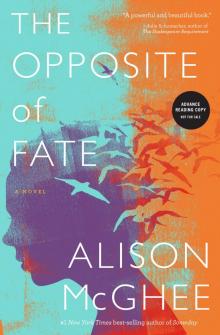 The Opposite of Fate (ARC)
The Opposite of Fate (ARC)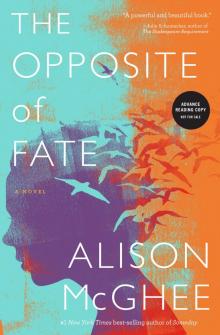 The Opposite of Fate
The Opposite of Fate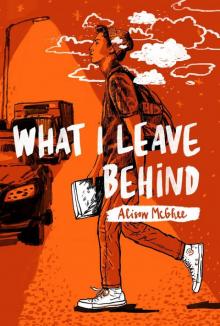 What I Leave Behind
What I Leave Behind Shadow Baby
Shadow Baby All Rivers Flow to the Sea
All Rivers Flow to the Sea Was It Beautiful?
Was It Beautiful? Firefly Hollow
Firefly Hollow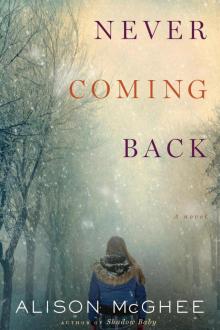 Never Coming Back
Never Coming Back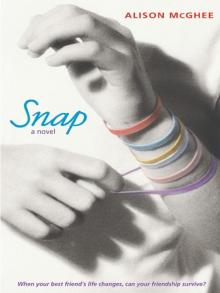 Snap
Snap Pablo and Birdy
Pablo and Birdy